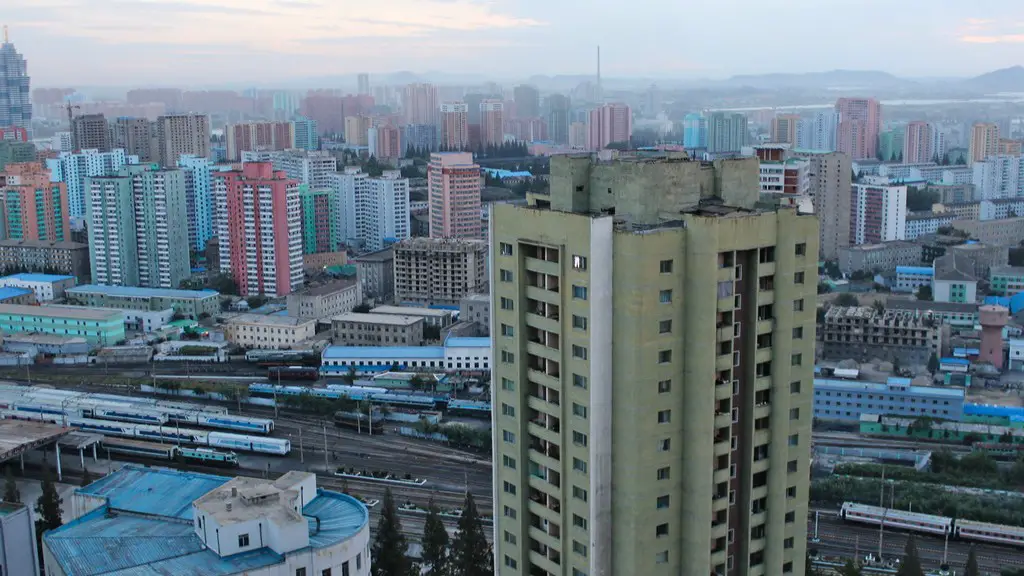There has been much speculation about the possibility of North Korea striking out militarily at the US. North Korea’s aggressive development of ballistic missile technology and nuclear weapons has alarmed many nations, and none more so than the US and its allies in the region. As the nuclear crisis between the two nations continues to escalate, many experts are speculating that a North Korean attack on the US is not only possible, but also increasingly probable.
In recent days, North Korea has conducted a series of successful ballistic missile tests, raising the stakes in the ongoing standoff. The most recent of these tests, a launch of an intercontinental ballistic missile, was seen as a blatant challenge to the US. In response, the US has convened an emergency meeting of the UN Security Council and is increasing the pressure on North Korea through sanctions and other diplomatic measures.
Experts point to a number of reasons for why North Korea may be contemplating a first-strike against the US. First, the North Korean regime has never been afraid to take risks when it believes that its survival is in danger. North Korea’s leaders have long seen a nuclear arsenal as the best way to preserve the regime and its ambitions. Second, North Korea is notoriously unpredictable, and is not afraid to launch surprise attacks in order to achieve its goals. Moreover, the regime is known for its extensive use of propaganda which could be used to justify a pre-emptive attack. Finally, the regime may view an attack on the US as a way to divert attention away from its other major issues such as its economic woes and its human rights record.
The implications of a North Korean attack on the US would be far-reaching. Experts warn that such a move could potentially draw in other nations and lead to a global conflict. Moreover, it would almost certainly result in significant loss of life and severe economic damages. Already, the US government has taken precautionary measures, including a heightened level of readiness by military and intelligence forces. Furthermore, the US has already begun to prepare for a potential strike by North Korea, with the deployment of additional troops, ships, and aircraft to the region.
Despite the evident danger posed by North Korea, there is still hope for avoiding a conflict. The US has been attempting to engage North Korea in negotiations, stressing the importance of diplomacy and dialogue. The US has also indicated a willingness to accept North Korea as a nuclear power, provided that it abides by international rules and norms. While this has yet to result in a breakthrough, many experts remain hopeful that an acceptable resolution can be reached.
North Korea’s Political History and Motivation
In order to understand the present state of tensions between North Korea and the United States, it is important to examine the political history of the country. North Korea is a totalitarian regime that is ruled by a single party – namely, the Korean Workers’ Party – and its leader, Kim Jong-un. Under Kim Jong-un’s rule, the country has become increasingly isolated, resorting to authoritarianism and repression to maintain control. Moreover, its aggressive foreign policy, directed at its neighbors as well as at the United States, is driven by a desire to maintain power and to protect its own interests.
North Korea’s policy of nuclear development is driven by its need for security. The country is surrounded by hostile forces and continually threatened by the potential of a US invasion. In its view, a strong nuclear capabilities is the best way to deter such a geopolitical disaster. Therefore, North Korea has pursued a policy of nuclear proliferation in order to build up its own deterrent against attack.
However, the danger of North Korea resorting to a first-strike attack is real. The country’s belligerent rhetoric, combined with its increasing levels of military diligence, could lead the regime to make a desperate move to save itself. In the worst-case scenario, this could include launching a pre-emptive strike against the United States.
U.S. response to North Korea’s Aggressive Posture
The US government has responded to the heightening tensions over North Korea’s nuclear program with a strong display of deterrence. US military forces have been deployed to the region, and the US has sought to build up an international coalition against North Korea. In addition, the US has imposed harsh economic sanctions in an effort to pressure North Korea into denuclearization.
However, the Trump administration has been criticized for its handling of the situation. Critics point out that the US has yet to develop a coherent policy towards North Korea, relying instead on a mix of threats and bluster. Moreover, the absence of diplomatic engagement over the course of the crisis has only served to heighten tensions. For these reasons, many experts believe that the US government should pursue a more measured, diplomatic approach towards North Korea.
At the same time, the US government has made clear that it will respond with overwhelming force if North Korea does launch a first-strike attack. The US has identified numerous military assets that it would deploy in such an event, including aircraft carrier battle groups and stealth bombers.
Furthermore, the US has reaffirmed its commitment to the mutual defense agreements it has with its allies in the region. These agreements provide a reassuring presence to US allies and could play a key role in deterring North Korea from launching an attack.
Implications for the International Community
The threat of a North Korean attack on the US has serious implications for the wider international community. If a conflict were to erupt, many nations would be drawn in, either directly or indirectly. Moreover, the ensuing economic and security ramifications could be disastrous.
For these reasons, the international community has a vested interest in preventing a North Korean attack on the US. To this end, many nations have taken a leading role in attempting to mediate the crisis. China, in particular, has sought to play a constructive role, using its economic clout and diplomatic influence to bring North Korea to the negotiating table.
The European Union has also sought to play a role in defusing the crisis. The EU has imposed its own sanctions on North Korea, while also working with the US and other nations to broker a diplomatic solution. However, it is unclear whether the EU’s efforts will be effective enough to avert a conflict.
Analysis and Insight
The threat of a North Korean attack on the US is a matter of serious concern. The situation is complicated by the fact that North Korea is an unpredictable, authoritarian regime that is determined to protect its own interests. Its nuclear capabilities are a major security concern, as is its propensity for surprise attacks. Nevertheless, there remains a hope that a negotiated solution can be reached, allowing the US and North Korea to set aside their differences and prevent a disastrous conflict.
However, the potential for a North Korean attack on the US is real, and the US and its allies have taken the necessary steps to deter such a move. The deployment of additional troops, ships, and aircraft, as well as the imposition of economic sanctions and the strengthening of regional alliances, all indicate that the US is prepared to respond with strength if North Korea does choose to launch a first-strike.
Finally, although tensions between the US and North Korea are escalating, it is important to remember that the international community has a major role to play in preventing an all-out conflict. The efforts of the EU, China, and other nations should not be overlooked, as they could be crucial in finding a peaceful resolution to the crisis.
Reactions From South Korea
South Korea has long been at the center of the tensions between the US and North Korea. As its neighbor to the north has become increasingly unpredictable and threatening, South Korea has come under increasing pressure to protect itself. To this end, the South Korean government has sought to strengthen its defensive capabilities, increasing its military presence in the region.
At the same time, South Korea has attempted to remain open to dialogue with its northern neighbor, stressing its commitment to peaceful co-existence. South Korea’s President Moon Jae-in has stated that he is willing to meet with Kim Jong-un in an effort to find a diplomatic solution to the crisis.
Moreover, South Korea has emphasized the importance of international support in ensuring the security of the region. Recent statements from the South Korean government indicate that it is relying on the US and its allies to help protect the country from potential North Korean aggression.
Global Opinions
The prospect of a North Korean attack on the US has sparked a range of reactions from around the world. While most nations have emphasized the importance of diplomacy and dialogue, there are some who have been more hawkish in their approach. The US, for example, has signaled its willingness to use overwhelming force if necesssary.
Other nations, such as China and Russia, have been more cautious in their stance. Both countries have urged restraint on all sides, expressing their support for a diplomatic solution to the crisis. They have also taken steps to pressure North Korea into negotiations, while also reassuring the US of their support.
Finally, citizens in many countries have voiced their concern over the escalating tensions. Demonstrations have been held in various cities around the world, with people calling for a peaceful resolution to the crisis. The message has been clear: that war must be avoided at all costs in order to prevent a disaster.
Economic Impacts of a North Korean Strike
If a North Korean attack on the US were to occur, the economic impacts would be highly significant. Not only would the US economy suffer greatly, but other nations would also suffer the consequences. Stock markets around the world would likely fall, as investors reacted to the heightened tensions. Oil and other commodities prices would also likely be affected, as increased uncertainty would likely lead to higher prices.
The economic impact on North Korea itself would also be severe. North Korea is already suffering from a severe economic crisis, and a conflict with the US would only exacerbate this. Countries across the world would be likely to impose economic sanctions on North Korea, resulting in a further reduction in trade, investment, and aid.
In addition, the cost of domestic reconstruction and damage control would be high. Not only would the US and its allies be faced with the cost of rebuilding infrastructure, but they would also have to contend with the long-term economic repercussions of a conflict.
Consequences and Ramifications of a Conflict
The consequences of a conflict between the US and North Korea would be widespread and devastating. The loss of life would be immense, with even a limited war likely to result in thousands of casualties. Furthermore, the environmental impacts of a conflict would be severe, as pollution and radiation would be released into the atmosphere.
In addition, the humanitarian crisis would be extensive. Millions of refugees would be forced to flee their homes, resulting in increased strain on resources and infrastructure in the region. Moreover, the instability caused by the conflict would undoubtedly have crippling economic impacts.
Finally, the conflict would have far-reaching geopolitical implications. Nations around the world would be forced to take sides and form alliances in order to protect their own interests. This could lead





